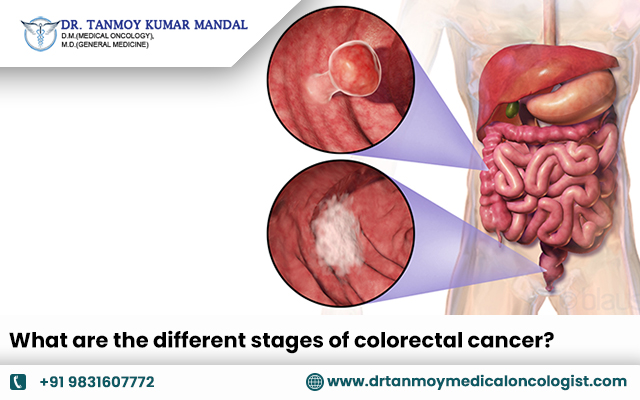Colorectal cancer, one of the most prevalent types of cancer worldwide, manifests in various stages, each with distinct characteristics and implications for treatment and prognosis. As with any cancer, early detection and understanding of the progression of the disease are crucial for effective management and improved outcomes. The best colon cancer doctor in Kolkata discusses the different stages of colorectal cancer, shedding light on their significance and what they mean for patients.
Stage 0: Carcinoma in situ
- At this stage, cancerous cells are restricted to the innermost lining of the rectum or colon.
- Often referred to as “in situ,” this stage signifies that cancer has not invaded deeper layers of tissue or spread to nearby lymph nodes or distant organs.
- Treatment for stage 0 colorectal cancer typically involves surgical removal of the cancerous tissue and it often leads to a complete cure.
Stage I: Localized Cancer
- Cancer has spread beyond the inner lining of the colon or rectum but has not metastasized to nearby lymph nodes or distant sites.
- In stage I, the tumour is confined to the colon or rectum and has not invaded nearby tissues or organs.
- Surgical resection remains the primary treatment and depending on various factors, adjuvant therapy such as chemotherapy may be recommended to reduce the risk of recurrence.
Stage II: Regional Spread
- In this stage, cancer has spread beyond the inner layers of the colon or rectum and may have invaded nearby tissues or organs, but it has not reached the lymph nodes.
- Stage II colorectal cancer is subdivided into stages IIA, IIB and IIC, depending on the extent of invasion and other factors.
- Treatment from the best chemotherapy doctor in Kolkata often involves surgery to remove the tumour and surrounding tissues, sometimes followed by adjuvant chemotherapy or radiation therapy to reduce the risk of recurrence.
Stage III: Lymph Node Involvement
- Cancer has spread to nearby lymph nodes but has not metastasized to distant organs.
- Stage III colorectal cancer is further classified into stages IIIA, IIIB and IIIC based on the number of lymph nodes involved and other factors.
- Treatment typically involves surgery to remove the tumour and affected lymph nodes, followed by chemotherapy to target any remaining cancer cells and reduce the risk of recurrence.
Stage IV: Metastatic Cancer
- Cancer has metastasized to distant organs or tissues, most commonly the liver and lungs.
- Stage IV colorectal cancer presents significant treatment challenges and the primary goal shifts from cure to prolonging survival and managing symptoms.
- Treatment options may include surgery, chemotherapy, targeted therapy, immunotherapy and radiation therapy, often used in combination to control the disease and improve quality of life.
Understanding the stage of colorectal cancer is essential for the colon cancer doctor in Kolkata in determining the most appropriate treatment approach and predicting prognosis. It enables healthcare professionals to give the best treatment plans to individual patients, considering other factors such as tumour size, location, grade and genetic characteristics.
Through continued research, education and early detection efforts, we can strive to improve the management and outcomes of colorectal cancer for patients worldwide.

